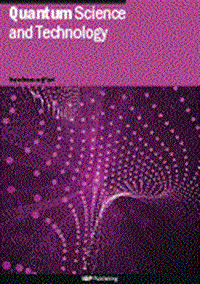Boundary-induced singularity in strongly-correlated quantum systems at finite temperature
IF 5.6
2区 物理与天体物理
Q1 PHYSICS, MULTIDISCIPLINARY
引用次数: 0
Abstract
Abstract Exploring the bulk-boundary correspondences and the boundary-induced phenomena in the strongly-correlated quantum systems belongs to the most fundamental topics of condensed matter physics. In this work, we study the bulk-boundary competition in a simulative Hamiltonian, with which the thermodynamic properties of the infinite-size translationally-invariant system can be optimally mimicked. The simulative Hamiltonian is constructed by introducing local interactions on the boundaries, coined as the entanglement-bath Hamiltonian (EBH) that is analogous to the heat bath. The terms within the EBH are variationally determined by a thermal tensor network method, with coefficients varying with the temperature of the infinite-size system. By treating the temperature as an adjustable hyper-parameter of the EBH, we identify a discontinuity point of the coefficients, dubbed as the ``boundary quench point'' (BQP), whose physical implication is to distinguish the point, below which the thermal fluctuations from the boundaries to the bulk become insignificant. Fruitful phenomena are revealed when considering the simulative Hamiltonian, with the EBH featuring its own hyper-parameter, under the canonical ensembles at different temperatures. Specifically, a discontinuity in bulk entropy at the BQP is observed. The exotic entropic distribution, the relations between the symmetries of Hamiltonian and BQP, and the impacts from the entanglement-bath dimension are also explored. Our results show that such a singularity differs from those in the conventional thermodynamic phase transition points that normally fall into the Landau-Ginzburg paradigm. Our work provides the opportunities on exploring the exotic phenomena induced by the competition between the bulk and boundaries.有限温度下强相关量子系统的边界诱导奇点
探索强相关量子系统中的体边界对应和边界诱导现象是凝聚态物理最基本的课题。在这项工作中,我们研究了一个模拟哈密顿量中的体边界竞争,用它可以最优地模拟无限大平移不变系统的热力学性质。模拟哈密顿量是通过在边界上引入局部相互作用来构造的,称为类似于热浴的纠缠浴哈密顿量(EBH)。EBH内的项由热张量网络方法可变地确定,其系数随无限大系统的温度而变化。通过将温度视为EBH的可调超参数,我们确定了系数的不连续点,称为“边界猝灭点”(BQP),其物理含义是区分从边界到体的热波动变得微不足道的点。在不同温度的正则系综下,考虑具有超参数的EBH的模拟哈密顿量,揭示了富有成果的现象。具体地说,在BQP处观察到体熵的不连续。本文还探讨了奇异熵分布、哈密顿量和BQP的对称性关系以及纠缠浴维数的影响。我们的结果表明,这种奇点不同于通常属于朗道-金兹堡范式的传统热力学相变点。我们的工作为探索由体和边界之间的竞争引起的奇异现象提供了机会。
本文章由计算机程序翻译,如有差异,请以英文原文为准。
求助全文
约1分钟内获得全文
求助全文
来源期刊

Quantum Science and Technology
Materials Science-Materials Science (miscellaneous)
CiteScore
11.20
自引率
3.00%
发文量
133
期刊介绍:
Driven by advances in technology and experimental capability, the last decade has seen the emergence of quantum technology: a new praxis for controlling the quantum world. It is now possible to engineer complex, multi-component systems that merge the once distinct fields of quantum optics and condensed matter physics.
Quantum Science and Technology is a new multidisciplinary, electronic-only journal, devoted to publishing research of the highest quality and impact covering theoretical and experimental advances in the fundamental science and application of all quantum-enabled technologies.
 求助内容:
求助内容: 应助结果提醒方式:
应助结果提醒方式:


